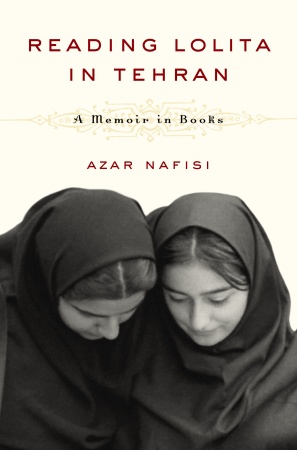Reading Lolita in Tehran
03.12.2005
![]() I recently read Reading Lolita in Tehran by Azar Nafisi, and promised some people a brief review.
I recently read Reading Lolita in Tehran by Azar Nafisi, and promised some people a brief review.
First, the book's extremely timely & gives a great snapshot of what living in a repressive regime like Iran is like (and the tragicomedic absurdity of such regimes). W/o preaching, or getting easily lumped into an ideological camp (in American-politics terms), she conveys the crushed hopes of a regime that, slowly but surely, obliterated the liberal freedoms she (and many Iranians) previously took for granted. Nafisi's open discussion of her college years' anti-Americanism, her early hopes for the Iranian Revolution, and her subsequent realization that many of her demands weren't well thought out is thought-provoking.
But the book's principally a discussion about the importance of literature. Especially in such a politically repressive context. It's opening premise (though it deviates as it moves back/forth through time) is a regular meeting of seven students (all female) who meet at Nafisi's home, in secret, to read & discuss banned books. Nafisi argues that literature (specifically, the modern novel) is a powerful political force. She writes about the "democratic" nature of the novel, how its characters (flaws & all) are approached w/ a respect to their internal complexities. These things, of course, don't exist in the black & white world of a totalitarian regime.
I'll warn that the book'll hit a nerve or two w/ many American leftists (especially those who refuse to believe that Iran really is a repressive regime). She's critical of the kind of anti-American protests that emerged on college campuses in the 1960s & 1970s (in which she participated). Mainly, because the critique of Western values weren't fully thought out. In Iran, she sees all her former "comrades" (she uses that word) purged by an increasingly radical Islamist regime as their slogans become reality. By the time they realize just what kind of world they've helped to create, it's too late.
Nafisi wrestles heavily w/ the issue of guilt, especially collective guilt. Like many survivors of totalitarian regimes (she cites Arendt & Adorno), she concludes that she, too, participated in creating the current regime. She wonders to what extent she consented to the rise of a regime that eventually forced her (and countless others, especially women) out the university, and under the veil.
Those are the "political" themes I took away. Beyond that, it's a great discussion of some of the major works in the Western canon. And it reinforces my idea to someday teach a course on "political novels" (e.g. 1984, Watership Down, Dune, etc). Bottom line: It lives up to the hype.
Posted by Miguel at 10:17 PM
Comments
It sounds really interesting. thx for the tip, will put it on my list of summer readings. N.
Posted by: Nenad at March 13, 2005 08:58 AM
It's on my read list ... maybe I'll start it tonight. Saloumeh has just gotten it as well.
Hmm ... leftest Americans... they should talk to Saloumeh and her family. They grew up in Iran and could tell you all about it. But, Saloumeh did say that in recent years things have gotten a bit more loose...
Posted by: Andres at March 14, 2005 01:25 PM
Try reading the Kite Runner. A novel from that segment of the world. Great character development, theme of personal guilt - nothing really very political. but very well written.
Posted by: beverly at March 15, 2005 09:46 PM